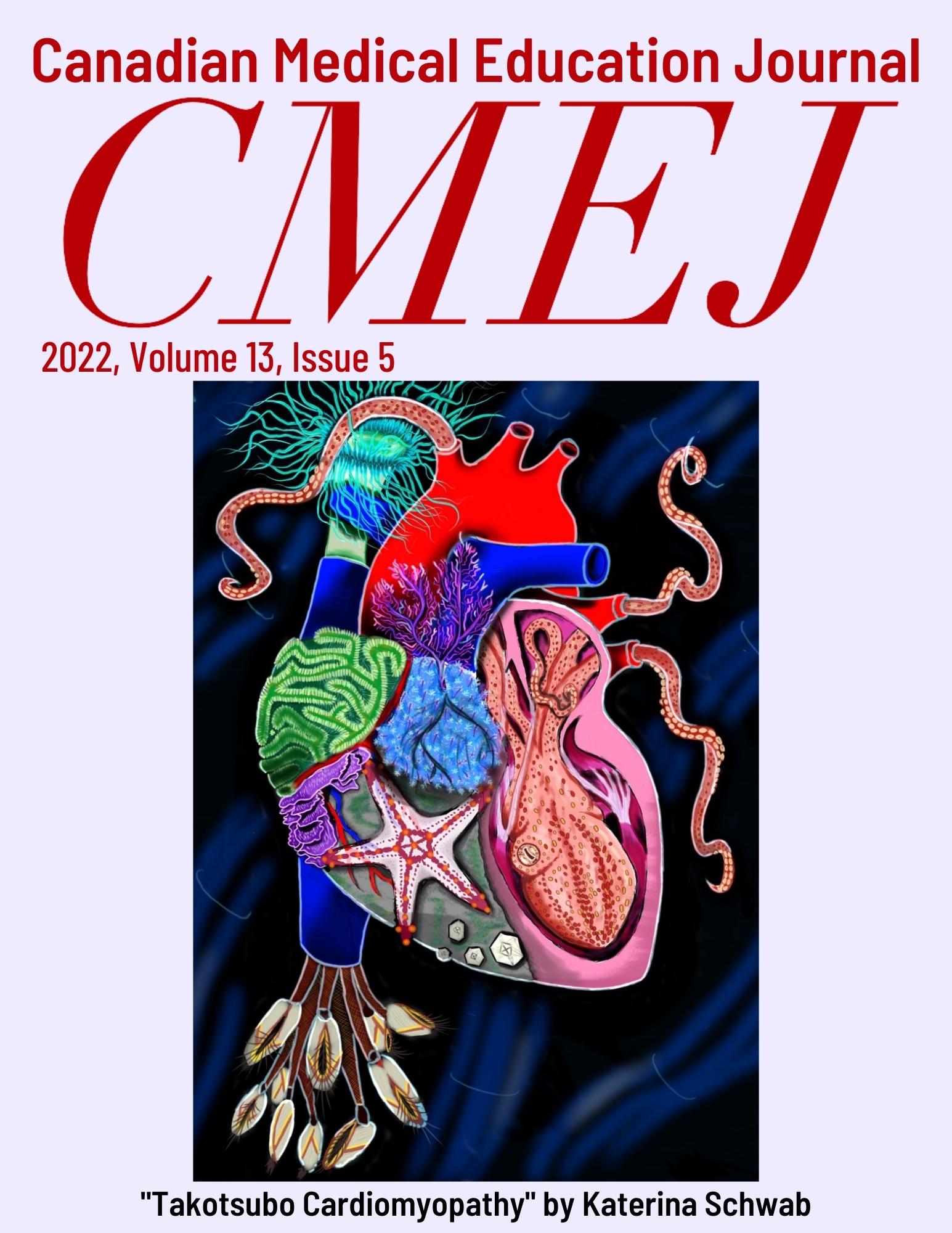Canadian fellowship experience: the different challenges and emotions faced by an International Medical Graduate and mitigation strategies
DOI:
https://doi.org/10.36834/cmej.74696Abstract
Acknowledging the mental remodeling that a foreign physician goes through and attempting to mitigate the difficulties of this process is crucial to achieving better outcomes in education and patient care. Canada's Healthcare System offers Clinical Fellowship Programs that allow physicians specialists to obtain advanced expertise in a chosen subspecialty. In a Clinical Fellowship, Canadian Medical Graduates (CMGs) practice alongside International Medical Graduates (IMGs); however, there is evidence that they undergo different challenges in the learning experience. IMGs usually have a higher cognitive load during the adaptation period, which can be due to multiple factors, such as the transition to practice in a foreign country, language, level of supervision, teaching methods applied, feeling disconnected from home, and other competing needs fellows face outside of the clinical context. We propose strategies that may help mitigate the transition to practice process that IMGs undergo when starting a Canadian fellowship, such as Self-Efficacy Encouraging Approach, Thinking Framework Across Cultures, and Social Engagement and Wellbeing.
References
Le Ray C, Wavrant S, Hudon L, Audibert F. Fellowship au Canada : mode d’emploi. J Gynecol Obstet Biol Reprod. 2009;38(2):188-194. https://doi.org/10.1016/j.jgyn.2009.01.006
Riva N, Lauw MN. Benefits and challenges of going abroad for research or clinical training. J Thromb Haemost. 2016;14(9):1683-1684. https://doi.org/10.1111/jth.13412
Storti C. The art of crossing cultures. 1990. Yarmouth, Maine: Intercultural Press. Pp. xix + 121. ISBN 0-933662-85-8.
Sockalingam S, Khan A, Tan A, et al. A framework for understanding international medical graduate challenges during transition into fellowship programs. Teach learn med. 2014;26(4):401-408. https://doi.org/10.1080/10401334.2014.945393
Sweller J. Cognitive load during problem solving: effects on learning. Cogn Sci. 1988;12(2):257–85. http://dx.doi.org/10.1016/0364-0213(88)90023-7
Farmer DL. Soft skills matter. JAMA Surg. 2015;150(3):207. https://doi.org/10.1001/jamasurg.2014.2250
Collins A, Brown JS, Newman SE, Montclair State University. Cognitive apprenticeship: Teaching the craft of reading, writing and mathematics. Thinking 1988;8(1):2–10. http://dx.doi.org/10.5840/thinking19888129
Sweller J, Ayres P, Kalyuga S. The expertise reversal effect. "Cognitive load theory. New York, NY: Springer; 2011.
Maslow AH. Theory of human motivation. Wilder Publications; 1943.
Wong A, Lohfeld L. Recertifying as a doctor in Canada: international medical graduates and the journey from entry to adaptation. Med Ed. 2007;42(1):53-60. https://doi.org/10.1111/j.1365-2923.2007.02903.x
Bandura, A. Self-efficacy. In VS Ramachaudran (Ed.), Encyclopedia of human behavior (Vol. 4, pp. 71-81). New York: Academic Press. (Reprinted in H Friedman [Ed.], Encyclopedia of mental health.) 1994. San Diego: Academic Press.
Meyer E. The culture map: decoding how people think, lead, and get things done across cultures. New York, NY: PublicAffairs; 2016.
Sharma M, Pinto AD, Kumagai AK. Teaching the social determinants of health: a path to equity or a road to nowhere? Acad Med. 2018;93(1):25–30. http://dx.doi.org/10.1097/ACM.0000000000001689
Mickleborough T, Martimianakis M. (Re)producing “whiteness” in health care: a spatial analysis of the critical literature on the integration of internationally educated health care professionals in the Canadian workforce. Acad Med. 2021;96(11S):S31-S38. https://doi.org/10.1097/ACM.0000000000004262
Unity Health Toronto. 2021. Physician wellness steering committee resources for physicians. [online] Available at: https://unityhealth.to/physician-wellness-steering-committee-resources-for-physicians/ [Accessed Oct 20, 2021].
Downloads
Published
Issue
Section
License
Copyright (c) 2022 Elio BR Belfiore, Fabricio Zasso, Filipe NC Santos

This work is licensed under a Creative Commons Attribution-NonCommercial-NoDerivatives 4.0 International License.
Submission of an original manuscript to the Canadian Medical Education Journal will be taken to mean that it represents original work not previously published, that it is not being considered elsewhere for publication. If accepted for publication, it will be published online and it will not be published elsewhere in the same form, for commercial purposes, in any language, without the consent of the publisher.
Authors who publish in the Canadian Medical Education Journal agree to release their articles under the Creative Commons Attribution-Noncommercial-No Derivative Works 4.0 Canada Licence. This licence allows anyone to copy and distribute the article for non-commercial purposes provided that appropriate attribution is given. For details of the rights an author grants users of their work, please see the licence summary and the full licence.











